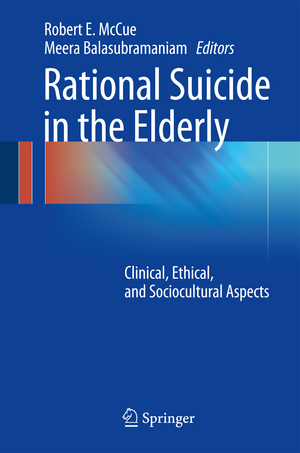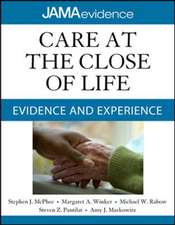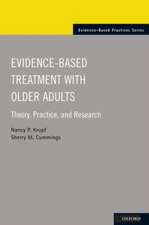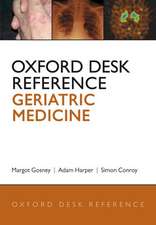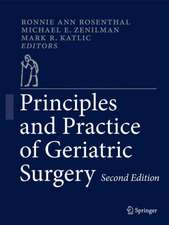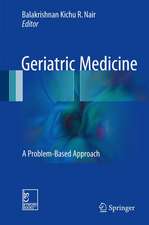Rational Suicide in the Elderly: Clinical, Ethical, and Sociocultural Aspects
Editat de Robert E. McCue, Meera Balasubramaniamen Limba Engleză Hardback – 8 noi 2016
Rational Suicide in the Elderly is an excellent resource for all medical professionals with potentially suicidal patients, including geriatricians, geriatric and general psychiatrists, geriatric nurses, social workers, and public health officials.
| Toate formatele și edițiile | Preț | Express |
|---|---|---|
| Paperback (1) | 377.04 lei 3-5 săpt. | +19.18 lei 6-10 zile |
| Springer International Publishing – 16 iun 2018 | 377.04 lei 3-5 săpt. | +19.18 lei 6-10 zile |
| Hardback (1) | 908.84 lei 6-8 săpt. | |
| Springer International Publishing – 8 noi 2016 | 908.84 lei 6-8 săpt. |
Preț: 908.84 lei
Preț vechi: 956.68 lei
-5% Nou
Puncte Express: 1363
Preț estimativ în valută:
173.91€ • 189.50$ • 146.54£
173.91€ • 189.50$ • 146.54£
Carte tipărită la comandă
Livrare economică 23 aprilie-07 mai
Preluare comenzi: 021 569.72.76
Specificații
ISBN-13: 9783319326702
ISBN-10: 3319326708
Pagini: 300
Ilustrații: XI, 224 p.
Dimensiuni: 155 x 235 x 23 mm
Greutate: 0.51 kg
Ediția:1st ed. 2017
Editura: Springer International Publishing
Colecția Springer
Locul publicării:Cham, Switzerland
ISBN-10: 3319326708
Pagini: 300
Ilustrații: XI, 224 p.
Dimensiuni: 155 x 235 x 23 mm
Greutate: 0.51 kg
Ediția:1st ed. 2017
Editura: Springer International Publishing
Colecția Springer
Locul publicării:Cham, Switzerland
Cuprins
Introduction (McCue).- Elderly suicide through history (McCue).- Acceptability of elderly suicide across cultures.- Baby boomers and the wish to control life and death.- Can suicide in the elderly be rational? (Lawrence Nelson).- Clinical criteria for rational suicide in the elderly.- Who are the elderly who want to end their lives?.- Existential issues in late-life rational suicide.- Psychological issues in late-life rational suicide (Elissa Kolva).- Psychodynamic issues in late-life rational suicide (Balasubramaniam).- Terminal mental illness and the wish to die (Barbara Sommer).- The impact of spirituality on the rationality of suicide.- The impact of psychotherapy on the rationality of suicide (Elissa Kolva).- The impact of psychopharmacology on the rationality of suicide (Balasubramaniam).- Commentary.
Recenzii
“The book discusses the recent movement toward legislation in the United States and in some European countries to provide a legal framework for ‘assisted suicide.’ … the book’s major appeal will be to clinicians from both the mental and general health arenas who work with older and chronically ill individuals and to teachers interested in educating our trainees to work more collaboratively and empathically with older adults … .” (Ira M. Lesser, American Journal of Psychiatry, Vol. 174 (6), June, 2017)
“Psychiatrists Robert E. McCue and Meera Balasubramaniam aim to provide a comprehensive overview of rational suicide among older adults, from the viewpoints of a variety of disciplines. … the authors get credit for tackling a difficult subject and assembling a set of chapters from diverse disciplines. This book is most likely to be of interest to readers who agree with the perspective that suicide in older adults who are not terminally ill can be rational.” (Amy Fiske and Julie Lutz, The Gerontologist, Vol. 57 (5), 2017)
“The purpose is to provide clinicians with guidance in managing a small population of older adults who want to have control of when and how they die. … This book is intended for use by medical professionals who work with older adults, including geriatricians, psychiatrists, psychologists, primary care doctors, hospitalists, palliative care specialists, educators, nurses, and social workers. … provides an excellent overview of this topic and is recommended for anyone prepared to work in this challenging, shifting clinical arena.” (Danielle L. Anderson, Doody's Book Reviews, March, 2016)“Psychiatrists Robert E. McCue and Meera Balasubramaniam aim to provide a comprehensive overview of rational suicide among older adults, from the viewpoints of a variety of disciplines. … the authors get credit for tackling a difficult subject and assembling a set of chapters from diverse disciplines. This book is most likely to be of interest to readers who agree with the perspective that suicide in older adults who are not terminally ill can be rational.” (Amy Fiske and Julie Lutz, The Gerontologist, Vol. 57 (5), 2017)
Notă biografică
Robert E. McCue, M.D. Clinical Associate Professor of Psychiatry; Program Director, Fellowship in Geriatric Psychiatry; New York University School of Medicine
Meera Balasubramaniam, M.D., MPH Clinical Assistant Professor of Psychiatry, New York University School of Medicine
Meera Balasubramaniam, M.D., MPH Clinical Assistant Professor of Psychiatry, New York University School of Medicine
Textul de pe ultima copertă
This book provides a comprehensive view of rational suicide in the elderly, a group that has nearly twice the rate of suicide when chronically ill than any other demographic. Views of rational suicide are evolving, particularly because of a growing older population with a longer life expectancy. However, there is little guidance for geriatric mental health professionals about this. The book's frame of reference does not endorse a single point-of-view about the legitimacy of rational suicide, but serves as a resource for both those clinicians who agree that older people may rationally commit suicide and those who believe that this wish may require further assessment and treatment. The first chapters of the book address the question of whether suicide in the elderly can be rational from bio-ethical and clinical perspectives and whether the nearness of death in late-life adults means that clinicians should approach suicide differently in that group than in younger adults. Clinical criteria for rational suicide in the elderly are proposed in this book for the first time. Another chapter addresses legal issues for clinicians treating older adults who wish a rational end of life. The book examines rational suicide in the elderly through history and across cultures, while also addressing the special case of Baby Boomers. Unlike any other book, this text examines the issue from existential, spiritual, psychological, and psychodynamic perspectives. Another chapter takes a novel look at the possibility of terminal mental illness and how this relates to suicide. This book is the first to consider psychotherapeutic, spiritual, and pharmacological interventions for an older adult who is contemplating suicide without a diagnosable mental illness. The book concludes with a commentary on modern society, aging, and rational suicide that ties all of these elements together, making this the ultimate guide for addressing rational desires for suicide among the elderly.
Rational Suicide in the Elderly is an excellent resource for all medical professionals with potentially suicidal patients, including geriatricians, geriatric and general psychiatrists, geriatric nurses, social workers, and public health officials.
Rational Suicide in the Elderly is an excellent resource for all medical professionals with potentially suicidal patients, including geriatricians, geriatric and general psychiatrists, geriatric nurses, social workers, and public health officials.
Caracteristici
Written by experts in the field The first book to consider all aspects of suicide in the elderly in all contexts The only text that discusses a neutral approach to clinical criteria current psychopharmacological and psychodynamic guidelines for rational suicide in the elderly
